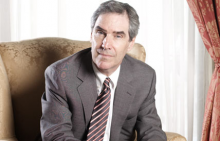By Michael Ignatieff
Bashar al-Assad’s artillery shells blast into Homs and families huddle in dark and unheated basements trying to stay alive as the shuddering assault edges ever closer. With the bombardment entering its fourth week, those watching video clips filmed with mobile phone cameras feel the same emotion they felt watching the siege of Sarajevo twenty years ago.
It is the feeling of shame.
You know it is shame when ‘the international community’ now talks, just as it did during the Sarajevo siege, not of stopping the carnage, but of offering ‘humanitarian’ assistance. The very word is abject. The people in the basements of Homs would be insulted to be called innocent victims in need of humanitarian rescue. They have been fighting to overthrow a regime.
Theirs is a fight to the death. They know this government will do with Homs what Mr Assad’s father did to Hama thirty years ago. They know that the son’s regime rests on the father’s primal obscenity. The fighters in Homs are holding out now because utter desperation puts them beyond fear. Watching them fight on, we have reason to be ashamed if we think the only thing we can do is send them bandages.
Resigning ourselves to carnage is also strategically foolish. It will leave us in a world where any tyrant knows he can shell his own people into submission, safe in the assumption no one will step in to stop him.
We need to understand what Mr Assad wants and deny it to him. What he wants is to plough Homs under as his father ploughed under Hama and leave Carthaginian desolation to guarantee that he rules until he dies peacefully in his own bed. He craves the reputation of ‘strongman’ and Homs will be made to confer that benediction.
But he wants more than this. Unlike the father, the son has pretensions.
A while ago, before all this started, an eminent couple I know dined with Mr Assad and his wife in Damascus. The dinner was relaxed and low-key, two Western couples talking about art and culture. As the president hunkers down now and orders his own people shelled, he must be hoping for the day when outsiders will persuade themselves once again that he is a modernising fellow held back by reactionary elements but determined on ‘reform’.
He must be stripped of these pretensions. The westernising Syrian middle class that jets between Damascus, Paris and London must be disabused of their illusions too. His hangers on need to understand that, once and for all, Mr Assad has earned for himself that ancient term of obloquy, hostis humani generi, enemy of the human race.
But arming the rebels or providing them with close air support gives the president what he wants: a fight to the finish where his brutality wins. Punching humanitarian corridors in from Turkey and gathering rebel populations in safe havens risks creating another Srebrenica.
So what do we do? In place of military intervention, nations can impose a comprehensive quarantine of Syria, designed to treat Mr Assad and his regime as an outcast, deny him any pretensions to legitimacy, drain any remaining support away from his cadre and force him from power.
Why should any country that values freedom still permit a Syrian embassy on its soil? Why should any country with an airport allow a Syrian commercial flight to land? Why should any Syrian associated with the regime be allowed a visa to a foreign country? Why should tankers still be landing fuel and arms at Syrian Mediterranean ports? These are the questions that shame and outrage suggest. Their answers imply a concerted strategy – it does not require a UN resolution – of quarantine of an entire country until its ruler gives up and the battered survivors of his carnage emerge from their basements and create a nation in which, whatever else they wish to achieve, they are free of a father and son’s vengeance.
